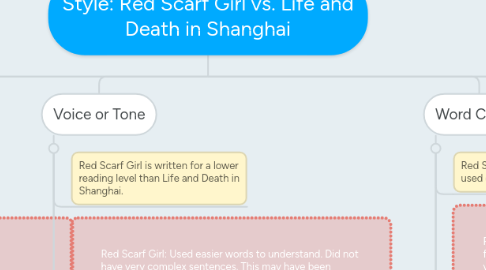
1. Figurative Language or Sound Devices
1.1. Red Scarf Girl and Life and Death in Shanghai are different in figurative language and sound devices.
1.2. Red Scarf Girl: Includes example of semicolon use.
1.2.1. "The butterfly fell out of its glass box; one wing was crushed under a jar of glass beads."
1.2.2. In the excerpt of Red Scarf Girl, no figurative language can be found. However, examples of different grammar use is found, as shown in the sentence above.
1.3. Life and Death in Shanghai: Examples of figurative language and phrases/clauses are found in snippet. Also included ellipsis
1.3.1. "Mounting the stairs, I was astonished to see several Red Guards..."
1.3.2. "The sound pierced my heart... I looked at what happened to my things, hopelessly but indifferently."
1.3.3. In the excerpt of Life and Death in Shanghai several examples are discovered: an example of figurative language, an example of a phrase is discovered.
1.3.3.1. "Mounting the stairs..." is an example of a participial phrase as the sentence begins with a verb with -ing.
1.3.3.2. "The sound pierced my heart..." is an example of personification as sound cannot literally "pierce your heart".
2. Sentence Length
2.1. Red Scarf Girl and Life and Death in Shanghai are similar in sentence length.
2.2. Red Scarf Girl: Most sentences are pretty long, but not all.
2.2.1. "The butterfly fell out of its glass box; one wing was crushed under a jar of glass beads."
2.2.2. "My stamp album!"
2.2.3. Shown above is examples of the different sentence lengths included in the excerpt of Red Scarf Girl. Although many sentences are long, like the first sentence, one or two sentences are shorter, like the second sentence.
2.3. Life and Death in Shanghai: All sentences are about the same length, relatively long.
2.3.1. "Mounting the stairs, I was astonished to see several Red Guards taking pieces of my porcelain collection out of their padded boxes."
2.3.2. In the section from the Life and Death in Shanghai, all sentences are around the same length as the example above.
3. Voice or Tone
3.1. Red Scarf Girl is written for a lower reading level than Life and Death in Shanghai.
3.2. Red Scarf Girl: Used easier words to understand. Did not have very complex sentences. This may have been intentional as the author was writing from a 12-year-old's point of view.
3.2.1. "My collection of candy wrappers had fallen out of their notebook and were crumpled under my stamp album."
3.2.2. If the excerpt had been written for a higher reading level, the author could have used more words to give the reader a clearer image.
3.3. Life and Death in Shanghai: Used slightly complex words. Target audience was more adult-like.
3.3.1. "I was astonished... I looked at what happened to my things, hopelessly but indifferently.
3.3.2. Words like "astonished" make the reader visualize the character actually being in the setting.
3.3.2.1. Life and Death in Shanghai has a slightly higher reading level than Red Scarf Girl does. It has more words that describe what is happening, giving the reader an in-depth narration.
4. Word Choice
4.1. Red Scarf Girl and Life and Death in Shanghai used completely different words in the excerpts
4.2. Red Scarf Girl: Used more basic words, written from child's point of view. Not a lot of vocabulary.
4.2.1. "It had been a birthday present from Grandma when I started school, and it was my dearest treasure."
4.2.2. The author used easy words. The reading level isn't very high, and there aren't many descriptive words.
4.3. Life and Death in Shanghai: Use more higher level reading vocabulary than Red Scarf Girl.
4.3.1. "I was astonished... I looked at what happened to my things, hopelessly but indifferently.
5. Sensory Details
5.1. Red Scarf Girl and Life and Death in Shanghai are similar in the amount of sensory details found in the articles.
5.2. Red Scarf Girl: Found two sensory details
5.2.1. "crushed under a bottle of glass beads"
5.2.2. "carefully soaking"
5.2.3. "Crushed" gives the reader an image of something completely flattened or shattered.
5.2.4. "Soaking" is a touch sensory detail; creates an image of a dripping cloth or something completely submerged in water or liquid.
5.3. Life and Death in Shanghai: Found two sensory details
5.3.1. "the crunch of the delicate porcelain"
5.3.2. "Crunch" is a sound sensory detail as the reader can almost hear the porcelain shattering under a man's foot.
5.3.3. "Delicate" is a look sensory detail. The reader can notice that the porcelain was carefully managed until the point of the man stomping on the porcelain.
6. Other
6.1. What are the structure types of the two texts?
6.1.1. Life and Death in Shanghai: In first person narrative form.
6.1.2. Red Scarf Girl: In first person narrative form. Follows the story of the author, Ji-Li Jiang.
6.2. What are the two texts about (meaning)?
6.2.1. The two texts are about Red Guards raiding the narrator's house. They talk about a part of the Chinese Cultural Revolution from their own experience.
6.3. What do the two texts have in common?
6.3.1. The excerpts from the Red Scarf Girl and the Life and Death in Shanghai are both focused on a first-hand experience of the Red Guards raiding the narrator's house. The narration of both texts are quite similar as they describe their precious items being damaged.
6.4. What is different in the two texts?
6.4.1. Red Scarf Girl has no signs of any type of figurative language while Life and Death in Shanghai, although small, has an example of personification.
6.5. How do the styles of the two texts differ?
6.5.1. The Red Scarf Girl is directed towards a younger audience while the Life and Death in Shanghai, and therefore has easy to understand words, and doesn't have very complex sentences.
6.5.2. Red Scarf Girl is written in the voice of a child, while the Life and Death in Shanghai is written in an older person's view.
